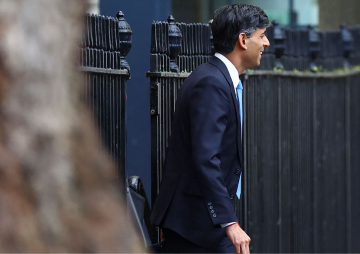China's decision in the 1980's to supply to Pakistan nuclear weapons technology and missiles capable of delivering nukes over long distances was intended to bind India down in a south Asian strategic impasse and constrict India's larger role in Asia and the world. China achieved only partial success in that objective. China's military - political support for Pakistan only steeled India's political will to face their combined hostility and strengthen its defense capability. India's international stature has actually been growing, especially after the unshackling of its economy in the 1990s and its conduct as a responsible nuclear weapon power. If China had ever contemplated a peace-role in South Asia, it has lost it; and its Pakistan policy has placed a ceiling beyond which it's political and security relationship with India cannot rise.
Within these constraints, however, scope exists - and efforts are needed from both sides - for an expanded and more cooperative relationship in economic, commercial, social and cultural fields. India must also engage China in a sustained political dialogue for the simple reason that in diplomacy in a globalizing world there is no room for nursing old grievances in sullen resentment. Besides, such a dialogue is necessary for reaching a settlement of the boundary problem. Viewed in this light, Prime Minister Vajpayee's June visit to China assumes special significance. A good part of the credit for the success of this visit goes to the new Chinese leadership, which also seems to have opted for a tangibly improved relationship with India of which the concession on Sikkim's status as a part of India is valuable evidence.
In the MOU signed in Beijing on Trade there is fairly explicit recognition of Nathu La as a pass on the India-China border, not Sikkim's border with Tibet or China. The designation of Chhangu in Sikkim as the trading venue is equally significant. China's proposal for opening of the Nathu La trade route had been on the table for 10 years: China had been insisting that Kalimpong - i.e. a venue in India, but outside Sikkim - be designated as the "Venue for border trade market", which demand the Indian side had firmly rejected. The change in China's position in this regard is a notable development.
Clearly, this has nothing much to do with India's reiteration of its oft-stated position on Tibet. On four or five occasions since 1954, we have used slightly varying formulations to say the same thing; namely, that Tibet is an autonomous region of China and, that Tibet, indeed, is a part of China. The June Declaration says no more, no less. But if the Chinese take same satisfaction in this reiteration of the same reality in a varying juxtaposition of words now and then, so be it. Tibet never was India's to hold or to give away. Only a sophist would see some kind of a surrender here on Vajpayee's part.
The agreement to give political push to border talks is another positive step. Wrangling between officials of the two sides has never in the past led to the least progress on the border issue. Defining the LoAC at any rate is an exercise in futility. In all sectors of the border, the two armies are firmly entrenched in the areas under their occupation, and both recognize that further encroachment by either side is out of the question. Therefore, a boundary settlement can now come only out of a political decision acknowledging and accepting the reality on the ground. The credit for proposing the appointment of political level special representatives to "explore the framework of a boundary settlement" goes to the Indian Prime Minister, who did it, characteristically, on the spur of the moment, without prior internal discussion or intimation to the Chinese side. That the Chinese responded positively, after a short interval of quick reflection, is indicative of the new regime's pragmatic and constructive approach to relations with India.
Legal niceties apart, China needs Aksai Chin as a vital link with Tibet; and India cannot give up Arunachal Pradesh. The question Brajesh Mishra should pose to his counterpart is: does China really need all the area it has occupied in Aksai Chin beyond its claimed traditional and customary line? And that, if India guarantees the security of Chinese roads in that region, will it return some part of that territory to placate public opinion in India in favour of "a fair, reasonable and mutually acceptable" settlement.
The agreement on 6 - month, multiple-entry business visas, which has received little attention in our media is likely in my view to prove of critical importance to the expansion of trade, investments and industrial collaborations between the two countries. Complementarities exist between the two economies which need to be exploited to increase exchanges for mutual benefit. The proposed appointment of a Joint Study Group of officials and economists, and enhanced direct air and shipping links etc. will help achieve that objective only if there is a positive attitudinal change in our bureaucracy's outlook on this issue and a policy review actually encourages Indian Business and Industry to actively explore avenues of heightened economic and trade activity.
Obviously there was some discussion of Pakistan's proxy war in J & K: a Chinese commentator is reported to have spoken of the visit's likely "positive impact on Pakistan - India relations". The Chinese may well advise Pakistan - as they have been doing since Jiang Jemin's visit to Islamabad in 1996 - to find a "peaceful solution to the Kashmir problem… through talks… in a conducive atmosphere". There is no ground for us to expect much more from Beijing in this regard. Pakistan is central to Chinas' South Asia policy and China is not going to give up.
The Joint Declaration - itself a novelty in India-China diplomacy - outlines a refreshing new framework of a cooperative relationship in a number of new areas; e.g. globalization, W.T.O., environment, cultural exchanges regional cooperation etc. etc. But the following comment on U.N. reform is of special interest:
"They (China & India) are determined to continue their efforts in strengthening the UN system. They re-affirmed their readiness to work together to promote reform of the U.N. In reform of the U.N. Security Council, priority should be given to enhanced representation of the developing countries."
An interesting formulation, which, nevertheless, leaves a great deal unsaid! Obviously, Japan is excluded from the purview of the contemplated expansion of the Security Council's permanent membership: but is India included? Is the contemplated enhanced representation to be in the council's permanent membership or an addition to its rotating segment? In the former case, will additional members have Veto power? Only time will answer these riddles.
1107
*M. Rasgotra is President of the ORF Institute of Asian Studies.
The views expressed above belong to the author(s). ORF research and analyses now available on Telegram! Click here to access our curated content — blogs, longforms and interviews.




 PREV
PREV

